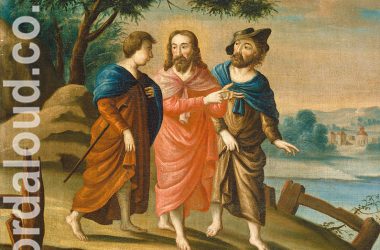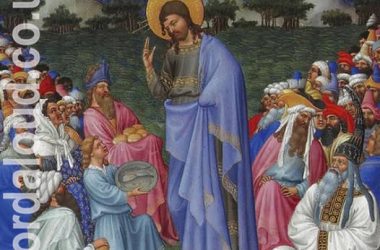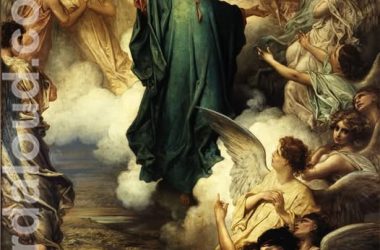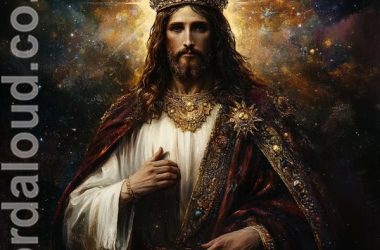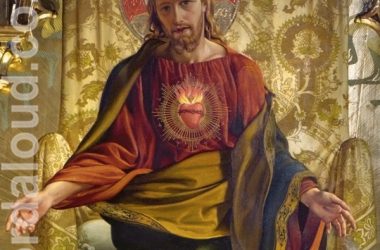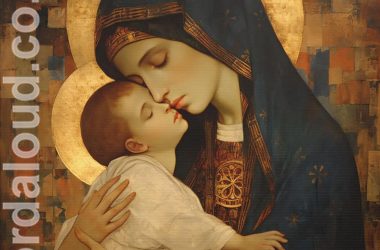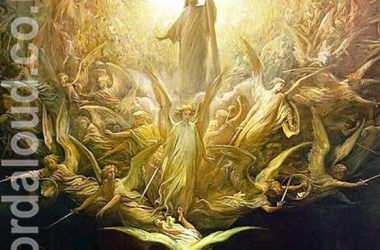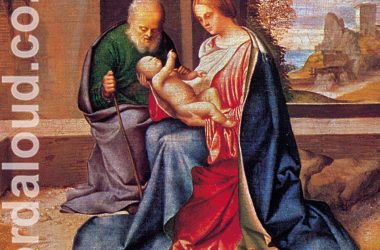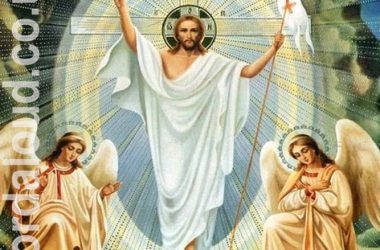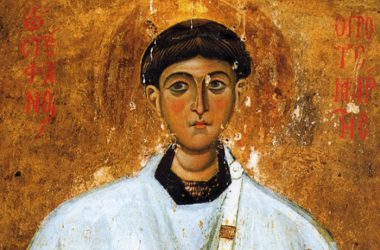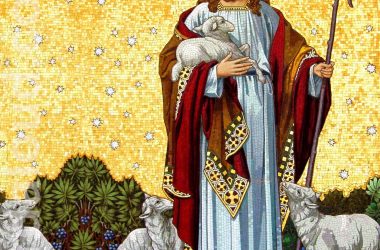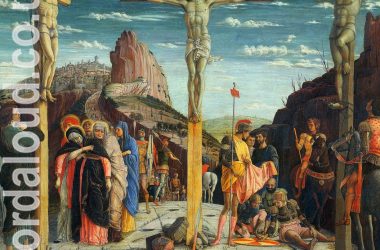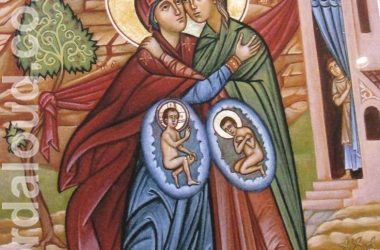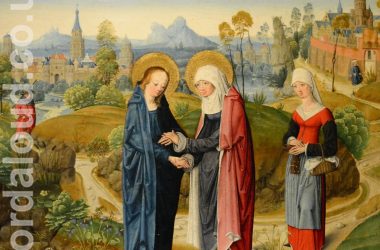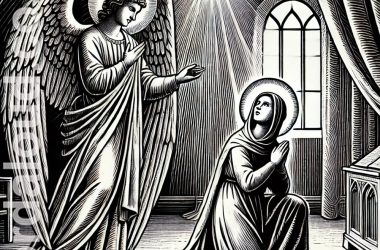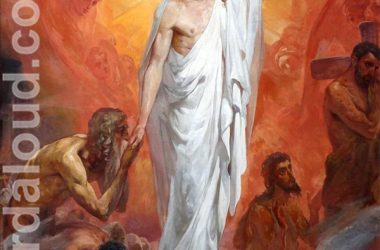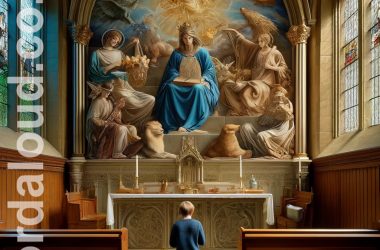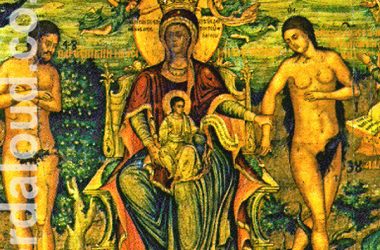In this reading from his letter to the Ephesians, Saint Ignatius of Antioch reflects on the importance of unity within the Christian community. Writing as a prisoner on his way to martyrdom, Ignatius speaks with humility and urgency. He does not present himself as a figure of authority, but as a fellow disciple who is still learning what it means to follow Christ [ … ]
Divine Office | Office Of Readings
Spiritual reflections on the love of Jesus Christ
Christian meditations | Jesus’ love through the ages
Office Of Readings | Week 1, Saturday, Ordinary Time | A Reading From The Letter Of Pope Saint Clement I To The Corinthians | By Faith God Has Justified All Men From The Beginning Of Time
This reading from the letter of Pope Saint Clement I to the Corinthians sets out an early Christian understanding of faith, justification, and good works. Clement addresses a community facing tension and division, and he appeals to shared scriptural history as a way of restoring unity and purpose. His argument develops in careful stages, moving from examples drawn from the Old Testament to practical conclusions for the present life of believers [ … ]
Office Of Readings | Week 1, Friday, Ordinary Time | A Reading From The Discourse Of Saint Athanasius Against The Gentiles | Through The Word A Truly Divine Harmony Is Reached In All Things
Saint Athanasius invites us to see creation not as a collection of disconnected parts, but as a single, living harmony held together by the Word of God. He begins with the words of Saint John’s Gospel: All things were made through him. This is the foundation of Christian faith about the world. Nothing exists by chance; everything exists because the Word – the Son of God – calls it into being and sustains it [ … ]
Office Of Readings | Week 1, Thursday, Ordinary Time | A Reading From The Discourse Of Saint Athanasius Against The Gentiles | The Word Of The Father Orders And Contains The Universe
In this passage from Against the Pagans, Saint Athanasius presents a carefully ordered vision of creation governed by the Word of God. His concern is not only to defend Christian belief against pagan thought, but to show that the structure and coherence of the world itself point to the Word as its source and sustainer [ … ]
Office Of Readings | Week 1, Wednesday, Ordinary Time | A Reading From The Treatise Of Saint Iranaeus Against The Heresies | Knowledge Of The Father Is The Manifestation Of The Son
In this reading from Against the Heresies, Saint Irenaeus sets out a central conviction of early Christian theology: knowledge of God the Father is possible only through the Son, the Word of God. This is not a matter of intellectual effort or philosophical ascent, but of divine self-disclosure [ … ]
Office Of Readings | Week 1, Tuesday, Ordinary Time | A Reading From The Longer Rules Of Saint Basil The Great | We Possess An Inborn Power Of Loving
In this reading from the Longer Rules for Monks, Saint Basil the Great reflects on the origin of love for God and its place in the moral life. Basil’s starting point is significant: love of God is not presented as something imposed from outside or learned through instruction alone. Instead, Basil argues that the capacity to love God is already present within human nature [ … ]
Office Of Readings | Week 1, Monday, Ordinary Time | A Reading From The Letter Of Pope Saint Clement I To The Corinthians | The Word Of God Is The Found Of Wisdom On High
This prayerful reading of Pope Saint Clement I, one of the earliest bishops of Rome, shows how firmly the first Christian communities understood their life to be grounded in God’s initiative rather than human achievement. Clement addresses God as Creator and Sustainer of all things, and places the Church entirely within God’s ordering of the world [ … ]
Office Of Readings | The Baptism Of The Lord Jesus Christ | A Reading From The Orations Of Saint Gregory Nazianzen | The Baptism Of Jesus Christ
Saint Gregory Nazianzen presents the baptism of Christ as an event that concerns not only Jesus Christ himself but the whole renewal of creation. From the opening lines, Saint Gregory draws the reader into participation: what happens to Jesus Christ is meant to happen to us all. Christ enters the water, and humanity is invited to enter with him; Christ rises, and humanity is raised with Jesus Christ [ … ]
Office Of Readings | 10th January | A Reading From The Commentary Of Saint Cyril Of Alexandria On Saint John’s Gospel | The Outpouring Of The Holy Spirit On All Flesh
Saint Cyril of Alexandria considers how the Holy Spirit is given to humanity through Christ. Saint Cyril’s central point is that the renewal of human nature is inseparable from the gift of the Spirit. Without the Spirit, humanity cannot return to the peace and stability intended by God from the beginning.[ … ]
Office Of Readings | 9th January | A Reading From The Orations Of Saint Proclus Of Constantinople | The Sanctifying Of The Waters
In this reading, Saint Proclus reflects on the feast of the Epiphany as a revelation that completes and deepens the mystery of Christmas. At Christmas, Jesus Christ is revealed in weakness, as an infant sharing fully in human vulnerability. At Epiphany, and especially in the baptism in the Jordan, Jesus Christ is revealed in his public mission and divine authority. The same Lord who lay in a manger now stands in the waters, sanctifying creation itself [ … ]
Office Of Readings | 8th January | A Reading From The Discourse On The Holy Theophany Attributed To Saint Hippolytus | Water And The Spirit | Theophany
The reading reflects on the baptism of Christ as a moment of revelation and renewal. The author begins by stressing the paradox of the event: Christ, who is the source of life, enters the waters of the Jordan. The language highlights the contrast between Christ’s divine identity and the humility of his action. The one who sustains creation submits freely to baptism, not out of need, but in obedience to the Father’s will [ … ]
Office Of Readings | 7th January Or Monday After Epiphany | A Reading From The Sermons Of Saint Peter Chrysologus | In Choosing To Be Born For Us, God Chose To Be Known By Us
Saint Peter Chrysologus reflects on the Incarnation as God’s deliberate choice to make himself known in a way human beings can receive. Although Christ’s divine nature was always present, it is disclosed through concrete events that speak to human senses and understanding. God does not remain hidden in abstraction, but enters history so that knowledge of him may be grounded in what can be seen, heard, and encountered [ … ]
Office Of Readings | Epiphany | 6th January | A Reading From A Sermon By Pope Saint Leo The Great | The Lord Has Made His Salvation Known To The Whole World
Pope Saint Leo the Great interprets the manifestation of Christ to the nations as the fulfilment of God’s long-standing purpose for the whole world. Salvation is not presented as an afterthought or a change of plan, but as the completion of a design already set in motion in the promises made to Abraham. From the beginning, God’s intention was that the blessing given to Abraham should extend beyond ethnic descent to all who share his faith [ … ]
Office Of Readings | Christmastide | 5th January | A Reading From A Sermon By Saint Augustine | Our Desires Will Be Completed, Fulfilled, In The Vision Of The Word
Saint Augustine reflects on the contrast between the hidden riches of Christ and the visible poverty of his humanity. What appears small and limited in Christ’s earthly life conceals the fullness of divine wisdom and knowledge. Augustine draws on the language of scripture to show that Christ’s poverty is not a loss but a means: through it, humanity is brought to a greater inheritance [ … ]
Office Of Readings | Christmastide | 4th January | A Reading From The Five Centuries Of Saint Maximus The Confessor | The Mystery Ever New
Saint Maximus the Confessor reflects on the incarnation as a mystery that is complete in itself and yet continually active in the life of the believer. Christ was born once in the flesh, in history, but he is also born spiritually in those who desire him. This second birth does not add to Christ, nor does it repeat the incarnation. Rather, it describes how the life of Christ takes shape in the believer through faith and virtue [ … ]
Office Of Readings | Christmastide | 3rd January | A Reading From Saint Augustine’s Treatises On Saint John | The Twin Commandments Of Love
In this reading, Saint Augustine reflects on the two commandments on which, according to Christ, the whole of the Law and the prophets depend: love of God and love of neighbour. Augustine presents Christ as the teacher who brings these commandments into focus and shows their central place in the Christian life [ … ]
Office Of Readings | Christmastide | 2nd January | A Reading From The Treatise Of Saint Basic The Great On The Holy Spirit | The Lord Gives Life To His Body In The Spirit
In this reading, Saint Basil explains the work of the Holy Spirit in giving life to the body of Christ and shaping the Christian life. A spiritual person is not one who rejects the body, but one who no longer lives according to the flesh alone and is guided by the Spirit of God. Such a person is called a child of God and is reshaped according to the likeness of God’s Son [ … ]
Office Of Readings | Christmas Octave | 1st January | A Reading From A Letter Of Saint Athanasius | The Word Took Our Nature From Mary
In this reading, Saint Athanasius explains why it was necessary for the Word of God to take a true human body from Mary. Athenasius begins by citing the teaching of the Apostle: the Word took on the descendants of Abraham and became like his brothers in all things. This likeness required a real human body, not an appearance or a substitute [ … ]
Office Of Readings | Christmas | 31st December | A Reading From A Sermon By Pope Saint Leo The Great | The Birthday Of The Lord Is The Birthday Of Peace
In this reading, Pope Saint Leo the Great reflects on the Nativity as an event that concerns not only Christ, but the whole Church. The feast renews the reality of Christ’s birth, even though the historical events of his childhood, passion and resurrection are complete. What is celebrated is not repetition, but participation [ … ]
Office Of Readings | Christmas | 30th December | A Reading From The Treatise Of Saint Hippolytus On The Refutation Of All Heresies | The Word Made Flesh Deifies Us
In this reading, Saint Hippolytus explains the Christian faith as a response to God’s initiative, not to human speculation. Faith is grounded in God’s own word, spoken by the Word himself. God seeks to restore humanity not by force, but by appealing to freedom [ … ]
Office Of Readings | Christmas | 29th December | A Reading From A Sermon By Saint Bernard | The Fullness Of The Godhead Came In The Fullness Of Time
In this reading, Saint Bernard reflects on the revelation of God’s kindness through the Incarnation. Bernard links the coming of Christ to what Saint Paul calls ‘the fullness of time’, when God’s purposes are no longer promised but realised [ … ]
Office Of Readings | Christmas | Sunday In The Octave Of Christmas | The Holy Family | From An Address Given At Nazareth By Pope Paul VI | This Humble And Sublime School Of Nazareth
In this address, Pope Paul VI reflects on Nazareth as the ordinary setting in which the Son of God lived most of his earthly life. Nazareth is presented not primarily as a place of historical interest, but as a school in which the Gospel is learned [ … ]
Office Of Readings | Christmas 27 December | Saint John, Apostle, Evangelist | From A Treatise By Saint Augustine On The First Epistle Of John | The Flesh Revealed Life Itself
In this reading, Saint Augustine reflects on the opening of the first letter of John and explains how the incarnation makes communion with God possible. A central concern is the reality of Christ: the eternal Word truly became flesh and was encountered through the senses [ … ]
Office Of Readings | Christmas 26 December | Saint Stephen, Our First Martyr | A Reading From A Sermon By Saint Fulgentius Of Rome | The Armour Of Love
Saint Fulgentius sets the martyrdom of Stephen directly alongside the birth of Christ. The two events are linked, not by time, but by meaning. Christ enters the world in humility; Stephen leaves it in witness. What Christ gives in his incarnation is shown at work in Stephen’s death.
Office Of Readings | Christmas Day | Nativity Of The Lord Jesus | A Reading From A Sermon By Pope Saint Leo The Great | Oh Christian, Be Aware Of Your Nobility
Saint Leo speaks of Christ’s birth as a source of joy that applies to all people. This joy does not depend on personal achievement or moral standing. Saints, sinners, and those outside the faith are all addressed. Christ comes because no one is free from sin, and therefore no one is excluded from the offer of salvation [ … ]
Office Of Readings | Advent December 24th | A Reading From A Sermon By Saint Augustine | Truth Has Arisen From The Earth And Justice Has Looked Down From Heaven
Saint Augustine speaks directly to humanity and frames the Incarnation as God’s action for our sake. His repeated call to ‘awake’ stresses that what God has done in Christ concerns human life now, not only at the end of time. God becomes man so that humanity may be restored to life [ .. ]
Office Of Readings | Advent December 23rd | A Reading From The Treatise Of Saint Hippolytus Against The Heresy Of Noetus | The Hidden Sacrament Is Revealed
Christian Art | Our Lord Jesus On The Cross | God The Father | God The Son Office Of Readings | Advent December 23rd | A Reading From The Treatise [ … ]
Office Of Readings | Advent December 22nd | A Reading From The Commentary Of Saint Bede On Saint Luke’s Gospel | Visitation Of The Blessed Virgin Mary | Magnificat
Saint Bede’s commentary follows the structure of Mary’s song the Magnificat in Luke 1:46–55 and explains the song with close attention to Scripture. Bede treats the Magnificat both as Mary’s personal thanksgiving and as a proclamation that concerns Israel and the fulfilment of God’s promises [ … ]
Office Of Readings | Advent December 21st | A Reading From The Commentary Of Saint Ambrose On Saint Luke’s Gospel | The Visitation Of The Blessed Virgin Mary
In this reading, Saint Ambrose reflects on the account of the visitation in Luke’s Gospel, where Mary goes to Elizabeth after the annunciation. He begins by explaining why the angel Gabriel mentioned Elizabeth’s pregnancy. It served as confirmation of God’s promise, not because Mary doubted, but to show that what God wills cannot be limited by age or circumstance [ … ]
Office Of Readings | Advent December 20th | A Reading From The Homilies Of Saint Bernard In Praise Of The Virgin Mother | The Whole World Awaits Mary’s Reply
In this reading, Bernard of Clairvaux reflects on the moment of the annunciation, focusing on Mary’s reply to the angel Gabriel. The reading does not retell the biblical narrative in a descriptive way but pauses at the moment before Mary speaks, treating her response as a decisive point in salvation history [ … ]
Office Of Readings | Advent December 19th | A Reading From The Treatise Of Saint Iranaeus Against The Heresies | The Operation Of The Redeeming Incarnation
This reading sets out a central theme in the theology of Saint Irenaeus: the relationship between God and humanity as one of action and reception. God acts; human beings receive. God’s glory is shown not apart from humanity, but in humanity restored and brought to fulfilment [ … ]
Office Of Readings | Advent December 18th | A Reading From The Epistle To Diognetus | God Has Revealed His Love Through His Son | God The Father, God The Son
This reading explains how God makes himself known to humanity. The reading begins by stating that God cannot be seen or known directly, but is revealed through faith. Knowledge of God is therefore not the result of human effort or observation, but of God’s own initiative [ … ]
Office Of Readings | Advent 17th December | A Reading From A Letter Of Pope Saint Leo The Great | The Mystery Of Our Reconciliation With God | True Humanity Of Jesus Christ
This reading explains why the true humanity of Jesus Christ is essential for salvation. Saint Leo insists that it is not enough to say that Jesus was human in a general sense. Jesus must be recognised as truly belonging to human history, descended from the line traced in the Gospels [ … ]
Office Of Readings | Advent Tuesday Week 3 | A Reading From The Imitation Of Christ | Of Humble Submission, Of The Good, Peaceable Man
This reading concerns the interior discipline required for humility and peace. It begins by redirecting attention away from other people and towards God. The question is not who supports us or opposes us, but whether our actions are aligned with God. A clear conscience before God is presented as the primary form of security [ … ]
Office Of Readings | Advent Monday Week 3 | A Reading From The Treatise By William Of Saint-Thierry On Contemplating God | He Loved Us First
William of Saint-Thierry reflects on salvation not as something we achieve, but as something we receive. From the beginning, he insists that God’s dominion is not oppressive power but saving love. To belong to God is already to be rescued, because serving God means being held within God’s care [ … ]
Office Of Readings | Advent Sunday Week 3 | A Reading From A Sermon By Saint Augustine | John The Baptist Is The Voice, And Jesus Christ Is The Word
Saint Augustine uses a simple but profound image to explain the relationship between John the Baptist and Christ: John is the voice, Christ is the Word. The image allows Augustine to show both the greatness of John’s mission and its necessary limitation. John’s role is essential, but it is temporary; Christ’s is eternal [ … ]
Office Of Readings | Advent Saturday Week 2 | A Reading From A Sermon By Blessed Isaac Of Stella, Abbot | Mary And The Church
Saint Isaac of Stella reflects on the deep unity between Christ, Mary, the Church, and the individual Christian. His central conviction is that God’s saving work is one, though it is shared in different ways. What is true of Christ is extended to those who belong to him; what is true of Mary is reflected in the Church; and what is true of the Church touches each believer [ … ]
Office Of Readings | Advent Friday Week 2 | A Reading From The Treatise Of Saint Irenaeus Against The Heresies | On Eve And Mary
Saint Irenaeus sets before us one of the earliest and most important Christian ways of understanding salvation: God heals humanity by retracing its steps. What was damaged at the beginning is not abandoned but restored, and it is restored in a way that respects both human freedom and God’s justice [ … ]

